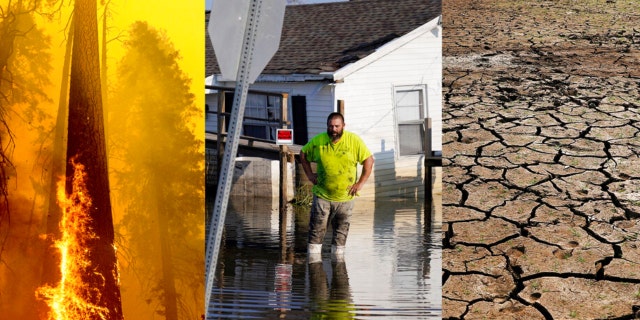NASA research: Local weather change impression on world’s crops anticipated inside subsequent decade
Local weather change could impression the manufacturing of corn (maize) and wheat as early as 2030, based on NASA researchers.
A brand new research from the company revealed within the journal Nature Meals stated that underneath a excessive greenhouse gasoline emissions situation, maize crop yields are projected to say no by 24% and wheat might doubtlessly see a development of about 17%.
NASA used superior local weather and agriculture modeling to search out the change in yields resulting from projected will increase in temperatures, rainfall sample shifts and elevated floor carbon dioxide concentrations from human-caused greenhouse gasoline emissions.
WITH COP26 CLIMATE CHANGE CONFERENCE UNDERWAY, WORLD LEADERS LOOK TOWARD DRASTIC CUTS IN EMISSIONS
The group of scientists used the local weather mannequin simulations from the worldwide Local weather Mannequin Intercomparison Venture-Part 6 (CMIP6). In addition they used the simulations as inputs for Columbia Unversity’s Agricultural Mannequin Intercomparison and Enchancment Venture (AgMIP) 12 state-of-the-art international crop fashions.
Every of the 5 CMIP6 local weather fashions used for this research runs its personal response of Earth’s ambiance to greenhouse gasoline emission situations by the 12 months 2100 and the MgMIP crop fashions simulate on a big scale how crops develop and reply to environmental circumstances.
In all, NASA created about 240 international climate-crop mannequin simulations for every crop.
The researchers examined adjustments to long-term common crop yields and launched a brand new estimate for when local weather change impacts will emerge, discovering that soybeans and rice projections confirmed a decline in some areas, although international fashions differed.
Impacts on corn and wheat, nevertheless, had been a lot clearer, as many of the fashions indicated comparable outcomes.
“North and Central America, West Africa, Central Asia, Brazil and China will doubtlessly see their maize yields decline within the coming years and past as common temperatures rise throughout these breadbasket areas, placing extra stress on the vegetation,” NASA wrote Monday in an accompanying news release. “Wheat, which grows finest in temperate climates, might even see a broader space the place it may be grown as temperatures rise, together with the Northern United States and Canada, North China Plains, Central Asia, Southern Australia and East Africa, however these beneficial properties could degree off mid-century.”
AL GORE: ‘TIME TO SAY GOODBYE TO COAL, OIL AND GAS WORLDWIDE’
Along with temperature shifts, greater ranges of carbon dioxide (CO2) within the ambiance can have a optimistic impact on photosynthesis and water retention and crop yields – although usually at a value to vitamin. This can occur extra so for wheat than maize.
The rising temperatures – in addition to droughts and warmth waves – have an effect on the size of rising seasons and speed up crop maturity.
Crippling drought and record-breaking temperatures parched the West this summer time and scientists say local weather change will proceed to make circumstances extra excessive and harmful in coming years.
In a United Nations report released in August, local weather specialists warned that the Earth is getting so scorching that temperatures in a few decade will most likely blow previous a degree of warming that world leaders have sought to stop, calling it a “code purple for humanity.”

This mixture of 2020-2021 pictures exhibits a burning tree in Sequoia Nationwide Forest, California; Nathan Fabre, whose house and boat had been destroyed by Hurricane Ida in Lafitte, Louisiana; and the cracked, dry backside of the Cerro Lagoon throughout an prolonged drought in Paraguay. Local weather change is fueling warmth waves, flooding, drought and nastier tropical cyclones.
(AP Picture/Noah Berger, John Locher, Jorge Saenz)
And the U.N. calculated this week that, between now and 2030, the world will emit up to 31 billion U.S. tons of greenhouse gases past the quantity that will preserve the planet at or under essentially the most stringent restrict set within the 2015 Paris climate accord.
Along with contributing to respiratory illness from air air pollution, greenhouse gas emissions entice warmth, warming the ambiance.
Human actions, primarily the burning of fossil fuels, have essentially elevated the focus of greenhouse gases in Earth’s ambiance.
CLICK HERE TO GET THE FOX NEWS APP
“We didn’t count on to see such a basic shift, as in comparison with crop yield projections from the earlier era of local weather and crop fashions carried out in 2014,” lead creator Jonas Jägermeyr, a crop modeler and local weather scientist at NASA’s Goddard Institute for House Research (GISS) and The Earth Institute at Columbia College, stated in an announcement. The projected maize response was surprisingly giant and detrimental, he stated. “A 20% lower from present manufacturing ranges might have extreme implications worldwide.”
“Even underneath optimistic local weather change situations, the place societies enact formidable efforts to restrict international temperature rise, international agriculture is going through a brand new local weather actuality,” he added. “And with the interconnectedness of the worldwide meals system, impacts in even one area’s breadbasket shall be felt worldwide.”
The group plans to have a look at financial incentives like altering farming practices and variations in future work.


